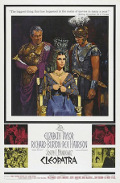
Directed by
Joseph L. Mankiewicz
243 minutes
Rated G
Reviewed by
Bernard Hemingway

Cleopatra
Synopsis: The eighteen year rise and fall of one of the most famous women of all time.Cleopatra is the mother of all 1960s Hollywood epics, not in temporal terms but in infamy. Originally conceived as a straightforward, money-spinning remake of its 1917 hit of the same name for 20th Century Fox with a $2m budget, by the time it wrapped it had cost $44m (around $500m in today’s money) and, despite its commercial success would only made back half its budget in theatrical sales having dragged Fox to the brink of bankruptcy..
The production got off to a bad start when it was decided to film it at Pinewood Studios in London. After a year and $7mill dollars there was barely any film to show for it. The production was relocated to Rome’s Cinecittà , Peter Finch and Stephen Boyd, the original Julius Ceasar and Marc Antony, left the production, and Rouben Mamoulian was replaced by Joseph L. Mankiewicz. Only Elizabeth Taylor remained, recuperated after a year of ill-health. Troubles were only beginning. Mankiewicz set about re-writing the script which by all accounts was terrible with both Finch and Taylor pronouncing it unactable. As Fox was desperate to see some return on its investment to date it insisted that the production start immediately. However with no shooting script, Mankiewicz had to film as he wrote and costs spiralled out of control. Then, there was the mixed blessing of the scandalous affair between Taylor and Burton, both married to other people at the time. Mankiewicz had envisaged two films, one dealing with Cleopatra and Ceasar, the other with Cleopatra and Marc Antony but the then Fox head, Darryl F. Zanuck insisted that there be only one film. Mankiewicz turned in a version over 5 hours long that was recut and released at just over 4 hours. After mixed reviews it was further cut to three and a quarters hours. The 4 hour version is the film everyone knows today.
Surprisingly under the circumstances it is quite a good film. Mankiewicz, who had had major hits as a writer-director with A Letter to Three Women (1949) and All About Eve (1950) was known for his literary sophistication and his script offers many delights. Basing the first part of the film on George Bernard Shaw’s “Ceasar and Cleopatra” and the second on Shakespeare famous play, the writer-director skillfully sets the Egyptian Queen;'s story off against the history of the times with their deadly and seemingly constant dynastic and national struggles in and around the Mediterranean that saw the Roman Empire become the largest imperial conglomerate the world have ever known.
Whilst of course the personal must be largely conjectural the result is much more modern than a purely historical perspective would demand. Rex Harrison plays Julius Caesar with the panache of a Prof. Henry Higgins from My Fair Lady (1964 and, coincidentally, also based on a Shaw play) and the bantering relation between the two is a lot of fun. After Ceasar is murdered and Marc Antony takes his place, the tone shifts to the Shakespearean with Burton and Taylor at times presaging their turns in Who’s Afraid Of Virginia Woolf (1966).
The staging is magnificent (and this was decades before CGI technology) with marvellous costume design and art direction, beautifully photographed by Leon Shamroy in Todd-AO (a 70mm format which Taylor owned, having inherited it from her former husband, producer Mike Todd) and embellished by Alex North’s score with the much-trumpeted (literally so) entrance of Cleopatra into Rome being the standout in this respect. And yet all this does not dwarf the main dramatic action which deals with powerful egos and even more powerful passions.
Taylor, in her most iconic role is outstanding, playing a legendary temptress (the actress’s ample cleavage is well on display throughout the film, with the ironic exception of her death from the bite of an asp, as legend has it, to her bosom) yet also one of steely ambition and fiery intelligence, mistress to Ceasar perhaps but master of Marc Antony and, even more, a woman susceptible to the pains of jealous love. Burton is also first class as the Roman general doomed to stand in the shadows of Julius Ceasar at both a public and a personal level. It is in drawing these complex believable characters that Mankiewicz’s skill as a writer impresses.
Don’t let its reputation as an overweight dog deter you, Cleopatra is a film well worth seeing.

Want more about this film?


Want something different?




